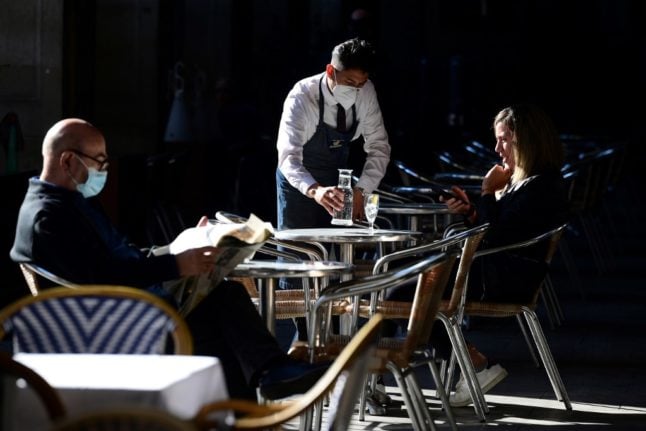What would Spain be without its bars, taverns, ‘chiringuitos’ and restaurants?
In 2018, there were reportedly 277,500 eateries across the country, making it a world leader in this sense with one establishment for every 175 inhabitants.
Not only is eating and drinking out an intrinsic part of Spanish culture, it’s the driving force behind its service-based economy, employing millions of people in the country who have been hit hard by the coronavirus lockdown and ensuing restrictions.
On Tuesday the Spanish government approved its “reinforcement plan” for its tourism and hospitality industries, in doing so becoming the last of the big European economies to come to the rescue of a sector that’s been crippled for months.
Germany, France and Italy, all countries where the hospitality industry represents up to 7 percent of their GDP compared to 20 percent for Spain, already rolled out rescue measures weeks ago. Holland, Romania and Luxemburg also reacted quickly.
Spain’s hospitality sector had called for €8.5 billion of direct aid to deal with the unprecedented crisis of 65,000 establishment closures and 100,000 more at risk.
But after a month of waiting, the rescue plan will not include direct aid and has been estimated by government spokesperson and Minister of Finance María Jesús Montero to be worth around €4.2 billion.
 Restaurant workers in Barcelona hold placards reading “Hospitality is not a virus”.
Restaurant workers in Barcelona hold placards reading “Hospitality is not a virus”.
The standout features of this decree for struggling bar and restaurant owners is that their landlords will be forced to cut rents and certain tax reductions.
Property owners renting out more than ten establishments who haven’t agreed to a temporary discount with their renters in the hospitality sector will have to slash rents by 50 percent until Spain’s state of emergency is lifted.
If the landlords own fewer than ten establishments they’ll be able to apply the rent reduction as a deductible Personal Income Tax expense during the first quarter of 2021.
The payment of taxes will also be deferred for six months for business owners, SMEs and self-employed workers in the sector (with a three-month grace period), up to a maximum amount of €30,000.
The hospitality sector had called for direct non-recoverable aid but the government will instead offer €500 million-worth of loans that have to be paid back by companies and ‘autónomos’ who apply for these ICO credits.
Restaurant tickets, which many companies give employees as a cost-saving perk, will also be able to be used for takeaways rather than just to eat on the premises.
“The aim is to provide aid and resources to significantly relieve the burden on businesses and facilitate liquidity,” Montero concluded.
But that hasn’t been the reaction from tourism and hospitality groups, who have called the measures “insufficient”.
“The government hasn’t offered a proper rescue plan that provides the aid we need to survive”, José Luis Yzuel, head of Spain's Hospitality Business Association said in reaction to the news.
“The rent reductions will only help 3 percent of the hospitality sector and leaves thousands of families unprotected,”.
“It’s a disgrace and it’s insulting that there isn’t a single measure which offers direct help for the sector, they’re just passing the buck to the regional governments,” Héctor Cañete, Yzuel’s counterpart in Galicia, added.
“There are measures that could have been implemented, such as the one in Germany where 75 percent of earnings from the same month in 2019 are being paid by the State to restaurant and bar owners.
“The government isn’t taking care of Spain’s tourism and hospitality sector.”



 Please whitelist us to continue reading.
Please whitelist us to continue reading.
Member comments